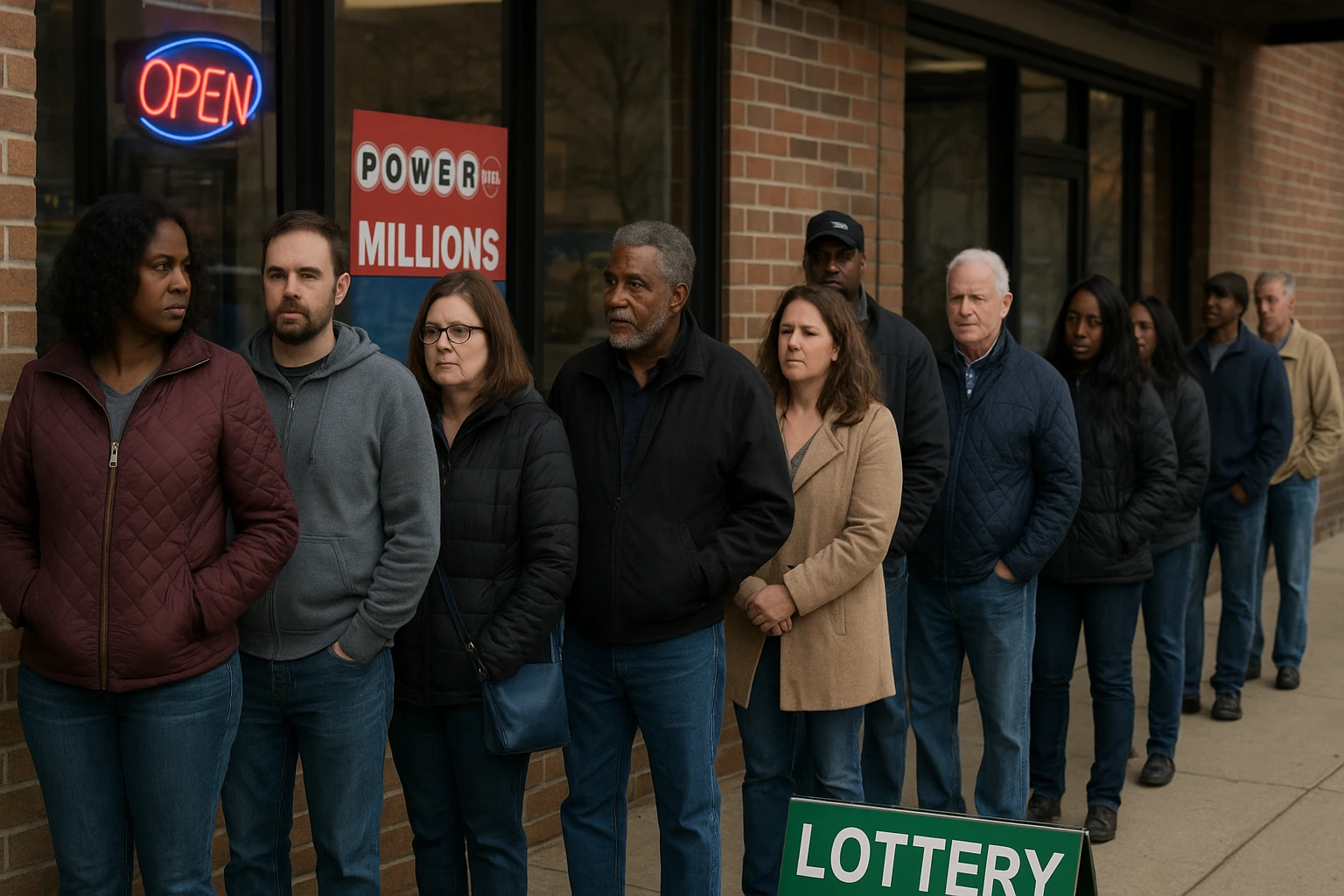The Powerball jackpot lottery winner is often celebrated as a symbol of overnight success, but behind the dazzling headlines and billion dollar dreams lies a deeper story one of economics, psychology, and society.
Americans spend billions chasing huge lottery jackpots every year, and while a few walk away with unimaginable wealth, millions face financial setbacks, particularly low income households.
This article dives beyond the hype of flashy numbers to explore how Powerball jackpots shape American lives, what data reveals about who plays the lottery, and how financial struggles influence gambling habits.
What You Will Learn in This Article
- The truth behind the Powerball jackpot lottery winner who plays, who wins, and the real cost of chasing billion dollar dreams.
- Actionable insights and strategies to approach lottery gambling more responsibly, including analysis of spending habits and alternatives.
- The future of huge lottery jackpots in the US trends, participation rates, and the social impact of gambling in times of financial hardship.
The Allure of the Powerball Jackpot
The Powerball is one of the largest lottery games in the world, famous for creating instant millionaires and, occasionally, billionaires.
Questions like how much is the Powerball jackpot today? or how much is the Powerball jackpot for Saturday, 6 September? trend on Google every time jackpots surge past $1 billion.
In fact, during September 2025, the jackpot swelled to $1.8 billion, making it the second largest in US history. The lump sum cash payout before taxes was estimated at $826.4 million.
But here’s the catch: while one Powerball jackpot lottery winner may change their life forever, millions of Americans lose money every week, especially in states with higher lottery participation.
Americans Playing Lottery: A Widespread Phenomenon
According to federal sales data, the Powerball lottery and Mega Millions Powerball jackpot are most popular in the Northeast, particularly Massachusetts and Rhode Island.
Massachusetts consistently ranks as the state with the highest per capita lottery spending. Rhode Island follows closely, with households often spending hundreds of dollars annually on lottery tickets.
This reveals a surprising truth: lottery participation rates are not evenly spread but heavily concentrated in specific regions.
During the COVID-19 pandemic, lottery ticket sales surged. Experts noted a direct link between economic hardship and gambling.
When people faced job losses, reduced wages, and uncertainty, many turned to lottery tickets as a low-cost chance at high reward.
The lottery gambling impact was profound: Powerball ticket sales jumped, and state revenues from lotteries increased.
The majority of participants particularly those from low income households and lottery players ended up spending larger percentages of their income with little return.
Economists such as David Just from Cornell University have pointed out that gambling and low income groups are closely connected. The poorer an individual, the more likely they are to buy lottery tickets.
This may seem irrational, but for many households facing financial struggles and gambling temptation, the lottery represents hope however unlikely of escaping poverty. A $2 ticket feels like an affordable dream.
A billion dollar jackpot provides an illusion of possibility. The lottery spending habits reveal that small purchases add up to significant financial losses over time.
Powerball Jackpot Analysis Odds and Reality
Here’s the reality check: the odds of winning the Powerball jackpot lottery winner title are 1 in 292 million. That’s less likely than being struck by lightning multiple times in your life.
Odds of dying in a car accident, 1 in 101. Odds of being struck by lightning, 1 in 15,300. Odds of winning Powerball: 1 in 292,201,338. Despite this, ticket sales soar each time a huge lottery jackpot is announced.
In 2021, a Massachusetts woman won $758 million in the Powerball. Overnight, she became one of the wealthiest people in the state. Yet, within three years, she faced lawsuits, family disputes, and financial mismanagement.
This illustrates a paradox: while Powerball jackpot winning numbers change lives, sudden wealth can also bring chaos without financial planning.
A low income family in Rhode Island shared their story with researchers: spending nearly $1,200 annually on lottery tickets, hoping for a miracle.
Over a decade, they lost more than $12,000 money that could have gone toward rent, education, or savings. This case shows how lottery gambling impact disproportionately affects vulnerable households.
Powerball Jackpot Today, Media and Public Attention, Whenever jackpots cross the billion dollar mark, national media outlets dedicate full coverage. People search daily for, Powerball jackpot winning numbers, Powerball jackpot today updates
How much is the Powerball jackpot for Saturday, 6 September
Social media trends show that Americans from every background students, professionals, and retirees get caught in the frenzy. But beneath the excitement, the economic hardship and gambling link remains a critical issue.
US Lottery Trends: Then and Now
Past Trend, Lotteries were state run revenue boosters with modest prizes. Present Trend, Mega Millions Powerball jackpot and Powerball have become billion dollar spectacles.
Future Trend, With AI driven gambling analysis, states may push more digital lottery participation.
The US is witnessing record breaking jackpots more often because no one wins for consecutive draws, rolling the prize higher each time.
While dreaming is human, here’s how to approach lottery participation responsibly, Budget Your Spending, Treat it as entertainment, not investment. Limit weekly spending e.g, $10 maximum.
Use Group Pools Office or family pools increase the chance of winning smaller prizes while reducing individual risk.
Invest Alternatives, Instead of $1,200/year on tickets, investing in an index fund could yield $15,000+ over a decade. Focus on Financial Literacy Programs teaching budgeting and saving can help reduce reliance on gambling.
David Just, Cornell University, There’s no group that doesn’t play the lottery, but lower income groups spend larger percentages of income on tickets.
National Council on Problem Gambling, Reports a spike in calls to helplines during times of financial crisis, correlating with lottery participation rates.
These insights highlight the urgent need for public awareness and responsible play strategies.
Hypothetical Scenario, If You Won
Imagine you become the next Powerball jackpot lottery winner, After taxes, your $1.8 billion jackpot shrinks to about $500 million depending on state taxes.
Without financial planning, wealth can vanish quickly due to lawsuits, reckless spending, or poor investments. With smart planning, you could establish generational wealth, invest in communities, or fund charities.
This scenario underscores why the story of winners is not just about luck but also financial responsibility.
Beyond numbers and odds, the lottery represents hope. For many Americans, especially in times of economic hardship, buying a ticket is more than gambling it’s a statement of belief in a better future.
But the truth is, while the lottery can make one person rich, it often keeps millions stuck in cycles of financial loss.
The Powerball jackpot lottery winner captures headlines, but the real winners are often state governments and lottery commissions who earn billions in revenue.
Low income households, on the other hand, bear the heaviest burden, spending significant portions of their limited income. Jackpots inspire dreams but come with harsh odds 1 in 292 million.
Low income households are most affected by lottery spending. Responsible play and financial alternatives are critical for avoiding long term losses.
As US lottery trends continue evolving, with bigger jackpots and more players, the social responsibility of addressing gambling’s impact grows too.
👉 If you found this article insightful, share it with friends, comment your thoughts on lottery habits, and subscribe for more deeP dive features into money, society, and culture.

